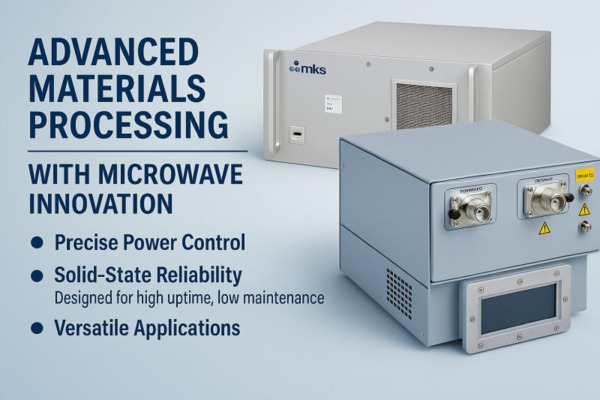Microwave Technology: Materials Processing for Demanding Industries
Overview
Microwave technology is fundamentally transforming materials processing across a range of demanding industries—including semiconductors, advanced ceramics, and waste treatment. By moving beyond conventional external heating methods, it delivers solutions that are demonstrably faster, cleaner, and more energy-efficient.
The core of this transformation lies in the unique way microwaves interact with materials: volumetric and selective heating. Unlike traditional methods that rely on slow heat transfer via conduction, microwaves penetrate the material and interact directly with molecules (through dipole polarization and ion conduction), generating heat from within the material itself.
Volumetric and selective heating offers several profound advantages for demanding industrial applications:
Faster Processing Times and Higher Throughput
- Rapid Volumetric Heating: Energy transfer occurs throughout the entire volume of the material simultaneously, dramatically accelerating heating rates and reducing processing times from hours to minutes or even seconds.
- Instantaneous Control: Microwave power can be adjusted instantly, without the long warm-up and cool-down cycles required by conventional furnaces. This precision improves process control and production speed.
- Reduced Diffusion Limitations: Rapid internal heating overcomes the limitations of thermal conductivity, which is particularly beneficial for processing large or thick parts and ensuring consistent properties.
Cleaner Processes and Improved Material Quality
- Reduced Contamination Risk: As a non-contact heating technology, microwaves eliminate the need for physical contact with heating elements or hot fluids, minimizing the risk of product fouling or contamination. In plasma-enhanced processes like MPCVD or ALD, this eliminates electrode erosion and metal ion contamination.
- Minimized Undesirable Reactions: The rapid heating and shorter processing times often suppress undesirable side reactions, leading to higher purity materials and improved product yields.
- Enhanced Microstructure: The unique temperature profiles can lead to improved material properties, such as smaller, more uniform grain sizes in ceramics and superior adhesion in coatings.
Greater Energy Efficiency and Sustainability
- Targeted Energy Use: Energy is focused directly on the material to be processed, minimizing heat loss to the surrounding environment and equipment. This can lead to energy savings of 30% to over 70% compared to conventional methods.
- Lower Operating Temperatures: Microwave processing often allows reactions and sintering to occur at lower bulk temperatures, reducing the overall thermal budget of the process.
- Eco-Friendly Operations: The use of electricity as an energy source avoids combustible gaseous by-products and reduces CO₂ emissions, supporting decarbonization goals and compliance with environmental regulations.
- Smaller Footprint: The compact nature of microwave equipment saves valuable production floor space.
In industries where every second, degree of purity, and watt of power count, microwave technology provides a powerful and sustainable competitive advantage by fundamentally improving how materials are processed.
Why MKS for Microwave Processing?
At MKS, we bring unmatched expertise in microwave power systems to enable advanced manufacturing processes:
- Frequency Versatility: We offer microwave generators at 915MHz, 2450MHz, and 5.8GHz, catering to a wide range of coating, material growth (like diamond), and industrial heating applications.
- Precise Power Control: MKS generators provide accurate, repeatable, and stable power control for consistent, reliable results every time.
- Solid-State Solutions: We lead with solid-state microwave solutions for enhanced reliability, adaptability, and faster response times across diverse processes.
- Reduced Downtime: Our modular, field-replaceable designs reduce the cost of ownership and maximize uptime in demanding production environments.
With decades of innovation and a commitment to process control and sustainability, MKS empowers manufacturers to meet challenges like precise control, reliability, and scalability.
Learn More:
- MKS offers compact industrial microwave generators and systems in 915MHz and 2450MHz that are adaptable to a wide range of applications. See our Microwave Generators and Systems here
- Contact an MKS Applications Specialist to discuss how MKS Microwave Systems can improve your process.

 Ultra-High Velocity
Ultra-High Velocity